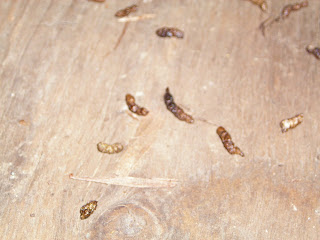
Posted by Steve N.
I finally identified this bat. Western Big Eared Bat (Plecotus townsendii). Look at those funky long ears! At first I thought it was a Long Eared Bat (Myotis Evotis), but their pelage is darker and the ears not as long. It is using the barn, the room next to the swallow's nest, for a day roost. This bat is all by his/her self and has been hanging out (no pun intended) on the ceiling. We are very lucky to have it occupying our barn because they are usually seen east of the Cascades. In fact, on the east coast of the U.S. these bats are endangered. I wonder how far it came to move into our barn...
The scats I found range from about 1/8 in.-3/4 in. long. Note the color of the scat in the photo below. These bats feed primarily on moths. He/she found a great spot. I hit and kill about 50 moths every night driving up the road to the campus.
Getting a decent picture of this bat was a challenge. I tried to get close a few times and the bat would fly around the room, up and down, fast and slow. A few times it flew so close to my head I felt the wind produced by its flapping wings. Western Big Ears are extremely versatile in flight. They vary from slow, long wing flaps (cruising) to quick and short flaps (hunting). They have even been seen hovering!
-Steve (photos courtesy of author)

Sources:
1. www.batsnorthwest.org
2. Maser, Chris. 1998. Mammals of the Pacific Northwest. Oregon State University Press
Oh, wow! We have bats living on the property already?
ReplyDeleteAwesome.
I love the Townsend's big-eared bats, they are so cool. Have you seen it sleeping with its huge ears tucked under its arms?
No, not yet. I have seen photos of them at rest with the tucked ears. That is what made me second guess the fact that it is a Townsend's Big Ear. I actually emailed my former bio teacher, a bat lover and chiroptologist. She recently saw a whole colony in an old gold stamp mill in the Sierra Nevadas. None had their ears tucked, even during the day.
ReplyDelete